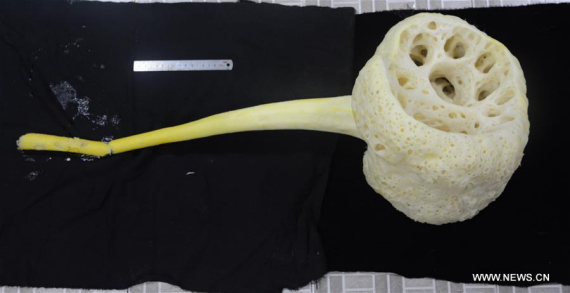 A sponge collected by Chinese scientists is seen on KEXUE (Science) scientific ship at the west of the Pacific Ocean on Aug. 14, 2017. (Xinhua/Zhang Xudong) China's remote operated vehicle (ROV) Discovery collected some samples from the Caroline Seamount in the western Pacific Ocean Monday, including a rare yellow sponge 80 centimeters high. "A sponge as large as this one is rarely seen. Normal sponge is white, but this one is yellow and it is interesting to find out the reasons," said Xu Kuidong, chief scientist aboard the Kexue research vessel. "Kexue" means science in Chinese. A large delicate Venus' flower basket, a kind of sponge, was also seen among the samples that Discovery collected on Monday. It has a white reticulate body and crystal thorns. In traditional Asian cultures, Venus' flower baskets were given as wedding gifts because the sponge symbiotically houses two small shrimps, a male and a female, who live out their lives inside the sponge. Besides, Discovery brought a sea urchin, a sea anemone, a starfish, a shrimp, several corals, two rocks and deep-sea water from the south side of the Caroline Seamount from a depth of 1,500 meters. As part of the Caroline Ridge in the Pacific Ocean, the Caroline Seamount is located south of the Mariana Trench, the deepest place on Earth, and east of the Yap Trench. It has never been explored before. |
Powered by Discuz! X3.4
© 2001-2013 Comsenz Inc.